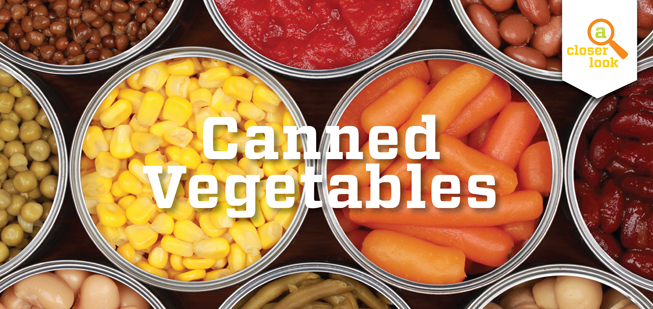WHAT ARE CANNED VEGETABLES?
Canned vegetables are vegetables that are processed, sealed, cooked, and stored in cans. This is a low-cost method to extend the shelf life of the vegetable. It also provides consumers with a convenient and cheap way to enjoy vegetables, no matter the season.
HOW ARE CANNED VEGETABLES MADE?
The fresh vegetables are washed, peeled if necessary, and then cut to the desired size. Next, they are blanched with steam and placed in cans. In the meantime, a brine is prepared in a heated mix tank.
Simple brines are usually made with just water and salt; sometimes preservatives are added as well. If the product is sweet, sugar or corn syrup is mixed with water and used as the brine. For other canned vegetables, a sauce is made using more complex ingredients. The brine or sauce is poured into the cans with the
prepared vegetables and sealed. The cans are then sent to be cooked in a retort. (A retort is a large pressure cooker filled with water.) This process kills the bacteria that cause food spoilage, allowing for the canned vegetable to be stored for long periods and remain fresh. At the end of the cooking process, the cans are cooled with cold water, dried, and labeled.
ARE CANNED VEGETABLES KOSHER?
There are a few kashrus concerns that can arise with canned vegetables:
EQUIPMENT
Since vegetables are seasonal, manufacturers may end up with downtime between harvesting seasons. To prevent costly downtime, many manufacturers produce additional products that can be processed year-round, such as bean products and pasta sauces.
Many bean products are made with animal fats. Similarly, many pasta sauces are made with non-kosher cheese or meat ingredients. In many manufacturing plants, the retort, as well as the heated mixing tank for the brine, are used for these non-kosher products. This will cause the equipment to become non-kosher and compromise the kosher status of the canned vegetable products if they are made with the same equipment.
Additionally, there are very large retorts that can process two products simultaneously and a plain vegetable product can be cooked at the same time as a pork and bean product. Even if they are processed in separate retorts, often the water used for heating or cooling the product is recycled between the lines.
ADDITIVES
All the additives need to be kosher certified. While there is no kosher concern with water and salt, as noted above, many canned vegetable products have more kosher sensitive additives.
TOLAIM INFESTATION
Some vegetables are prone to bug infestations. The canning process does not eliminate this issue. Vegetables prone to infestation require proper cleaning and inspection procedures before beginning the canning process.
BISHUL YISROEL
Vegetables require bishul Yisroel if they are not edible raw1 and if they are fit for a king’s table. Therefore, it is necessary to ensure that the cooking of these vegetables will be done with the involvement of the mashgiach.
OK Kosher recommends only purchasing canned vegetables with a reliable kosher certification.
1. Some vegetables, such as hearts of palm, are edible raw in the manufacturing countries, but they are not sold as raw vegetables in the US. This brings us to an interesting question – is bishul Yisroel necessary for hearts of palm? The accepted psak is that we go by the place where the vegetable is cooked; in that case hearts of palm do not require bishul Yisroel.
Rabbi Hendel is a member of the OK Kosher Vaad HaKashrus.


 EN
EN  ZH
ZH  KR
KR  BR
BR  ES
ES  IN
IN  IL
IL 




